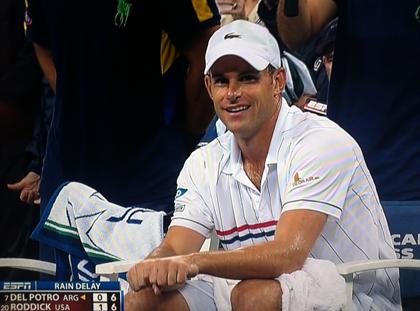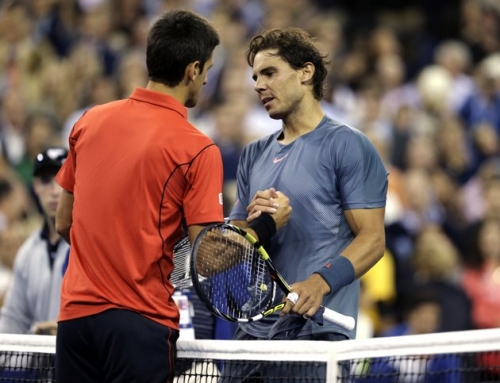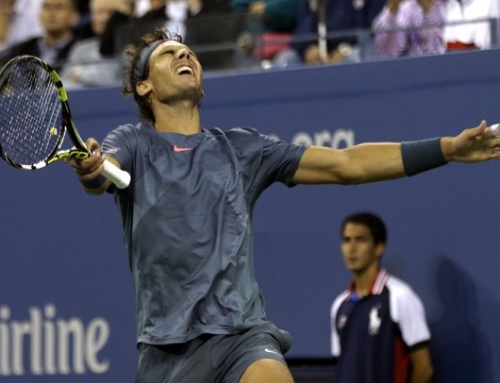 When Andy Roddick came up around 2000, he was the next Pete Sampras. The problem? Roger Federer. When Pete Sampras retired, he left something of a vacuum. There were supposed successors to the mantle of Sampras. Two came from men who beat Sampras in 2000 and 2001. Those were Marat Safin and Lleyton Hewitt. Those two were part of the new generation, players that wanted to take over the mantle of the sport. The American hope lay in Andy Roddick.
When Andy Roddick came up around 2000, he was the next Pete Sampras. The problem? Roger Federer. When Pete Sampras retired, he left something of a vacuum. There were supposed successors to the mantle of Sampras. Two came from men who beat Sampras in 2000 and 2001. Those were Marat Safin and Lleyton Hewitt. Those two were part of the new generation, players that wanted to take over the mantle of the sport. The American hope lay in Andy Roddick.
Roddick had the big serve, the big forehand. He was a looker. Sampras, for all his success, was never quite the handsome fellow. Much like Steffi Graf, he outgrew late teen black swan period and something of a white swan afterwards. But Roddick was a golden boy from the start. It might have said something that Sampras, in his final hurrah at the 2002 US Open, beat Andy Roddick. At the time, Pete Sampras’s ranking had slipped so badly, a product of not winning a tournament in two years, that he was the 17th seed, but Roddick had not risen high enough to be much better than the 11th seed.
Little would Roddick know that the stalwarts of his generation, Hewitt, Safin, Ferrero, and Nalbandian would fade to be replaced by the great one, Roger Federer. Federer would dominate starting from 2003 to about 2007. In the middle of Federer’s dominance, Nadal would rise, become dominant on clay. Djokovic would break through in 2007. Murray would break through in 2008, as would del Potro. And Roddick would be pushed lower and lower, hanging in the top ten, as players like Hewitt and Nalbandian would slip like so many passengers on a suddenly vertical Titanic.
Roddick would reinvent his game. He replaced a subpar backhand with an OK backhand. He replaced a big, but risky forehand, with a topspin forehand. He replaced a game of chance with a game of steadiness. He replaced booming aces with a variety of serves that lead to fewer aces, but better percentage of holds.
Roddick realized, perhaps sooner than others, that Federer was better than he was, and that he couldn’t make up for that talent gap. And when Nadal showed up, then Djokovic, he realized that the next generation was going to be even better than his generation.
So, Roddick scaled back his goals. To give a sense of this, consider a player like Tomas Berdych. He came out of nowhere in the 2004 Olympics to upset Roger Federer. Berdych reached a goal of winning 50 matches last year, a goal that players like Federer or Nadal take for granted. When Berdych reached the quarterfinals of the US Open this year, he reached a goal of making the quarterfinals of every Slam. When you’re not going to be the best player in the world, smaller goals are what you aim for.
For Roddick, he wanted to be in the top ten. He wanted to win a tournament each year. He wanted to be relevant in a Slam every once in a while. Due to winning a Slam in 2003, very early in his career, Roddick, and more importantly, the American media, had higher expectations, but Roddick learned to scale back his expectations and take pride in that. He played Davis Cup. He played the Olympics. He strived to stay in the top ten. He won titles every year.
And while his critics weren’t happy that he wasn’t winning Slams, this was enough for his legacy. Had he been more talented, maybe he would have regretted not achieving more, but he wasn’t, so he did as much as he could.
Andy Roddick found it hard to compete against Roger Federer in other ways. Federer has always been rather stoic on court, and all smiles and niceties off court. This was a big change for Federer who had a bit of a temper as a teen, but learned to avoid those emotional extremes. Meanwhile, Roddick picked up some habits of another American, John McEnroe.
Roddick would grumble at the umpire. Criticize him if he overruled. Criticize him if he didn’t. Last year, at this time, Roddick complained that the rain water was seeping from underneath the court making it unplayable. He wondered why he was bring brought on court when it was unplayable. Roddick chose not to be patient. He was upset. He let people know about it.
This kind of behavior made some folks turn away from Roddick. If he couldn’t win Slams like Federer, could he not, at least, act like him? But Roddick doesn’t suffer fools.
At the very least, with his retirement so imminent, Roddick is trying to take it all in, trying not to get himself in a foul mood, to prevent the last memory of Roddick be one of negativity. Roddick wants to work with his foundation, and the last farewell, and the last hurrah, should be positive.
As the rains fell in the first set tiebreak between him and del Potro, he caught his coach, Larry Stefanki, doing a kind of dance in the stands. This elicited a smile out of Roddick.
And, now that rain has called off Tuesday’s matches, which include Djokovic against Wawrinka where he’s up an early break 2-0. Janko Tipsarevic is also up against a tired Philipp Kohlschreiber. Ferrer did finish his match against Gasquet and took it in straight sets.
In the end, Andy Roddick may lose to Juan Martin del Potro, but he’ll have given his best. He’ll have moved on with no regrets. He’ll have passed from a life of tough questions to a life of working with his foundation and support his wife. Maybe he’ll coach. Who knows? Roddick already does a radio show. He’s a bright guy. Roddick may not have not lasted longer then Connors, but he can say there’s life after 30, and it ain’t half bad.





![[US Open Men’s Final] Can Djokovic beat Nadal in the finals?](https://www.essentialtennis.com/wp-content/uploads/2013/09/20130909djokovic-500x383.jpg)
![[US Open, Semis] Djokovic and Nadal to play US Open final once again](https://www.essentialtennis.com/wp-content/uploads/2013/09/20130907nadal-500x383.jpg)
![[US Open, Day 11, QF] Wawrinka upsets Murray in straight sets to make first Slam semi](https://www.essentialtennis.com/wp-content/uploads/2013/09/20130906wawa-500x383.jpg)